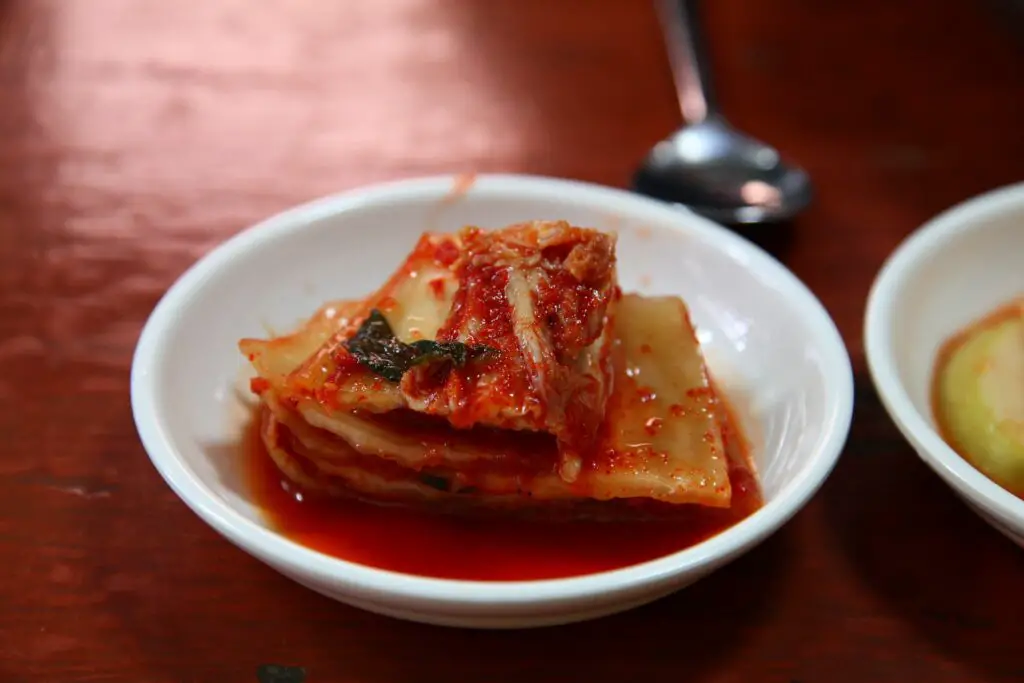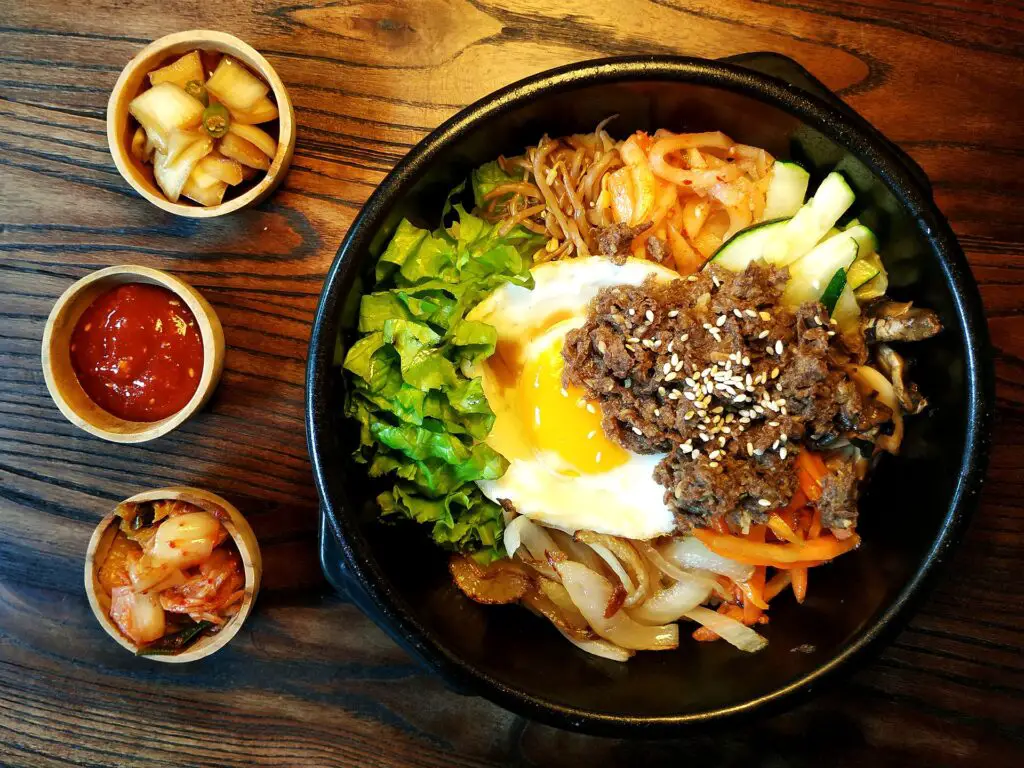If you’re following a low FODMAP diet, you may be wondering if kimchi is a safe food to eat. Kimchi is a traditional Korean dish that is made from fermented cabbage and other vegetables. It is usually spicy and sour in flavor. Kimchi is a good source of fiber, vitamin C, and potassium that can be eaten at dinner. It also contains probiotics, which are beneficial for gut health. So is kimchi low FODMAP? Let’s take a closer look.
Is Kimchi Low FODMAP?
The short answer is yes, kimchi is low FODMAP. However, it is important to note that not all brands of kimchi are created equal. Some brands may add high FODMAP ingredients such as garlic or onion to their kimchi, so it is important to read the label before purchasing. If you’re looking for a low FODMAP kimchi, be sure to choose one that is made with cabbage, radish, ginger, and chili pepper. These are all low FODMAP ingredients.
Kimchi is a low FODMAP food that you can enjoy without having to worry about triggering your symptoms. Be sure to choose a brand that is made with low FODMAP ingredients, and enjoy kimchi as part of a healthy, balanced diet.

What Is Kimchi?
Kimchi is a traditional Korean dish that is made from fermented cabbage and other vegetables. It is usually spicy and sour in flavor. Kimchi is a good source of fiber, vitamin C, and potassium. It also contains probiotics, which are beneficial for gut health. Also, they are low in FODMAP. Some brands may add high FODMAP ingredients such as garlic or onion to their kimchi.
Benefits Of Eating Kimchi
Kimchi is not only low in FODMAP but it is a good source of fiber, vitamin C, and potassium. It also contains probiotics, which are beneficial for gut health. Here are ten benefits of kimchi:
1. It Is A Low FODMAP Food
As we mentioned, kimchi is a low FODMAP food, which means it is unlikely to trigger symptoms in people with IBS or other digestive disorders and is a safe food to eat for most people similar to potato chips.
2. It Is A Good Source Of Fiber
Kimchi is a good source of fiber, which is important for digestive health. Fiber helps to keep things moving along in the digestive system and can help to prevent constipation.
3. It Contains Vitamin C
Kimchi is a great source of vitamin C, which is a needed nutrient for overall health. Vitamin C is involved in many processes in the body, including immunity, wound healing, and iron absorption.
4. It Is A Good Source Of Potassium
Kimchi is a good source of potassium, which is an essential mineral for health. Potassium is involved in many processes in the body, including muscle function, heart function, fluid balance, and getting rid of toxins.
5. It Contains Probiotics
Kimchi is a fermented food, which means it contains probiotics. Probiotics are beneficial bacteria that live in the gut and have many health benefits, including improved digestion and immunity.
6. It Is Spicy And Sour In Flavor
Kimchi is usually spicy and sour in flavor, which many people enjoy. The spiciness comes from the chili pepper that is used to make kimchi.
7. It Is Beneficial For Gut Health
It helps in gut health because of the probiotics present in it and also due to its low FODMAP content. Also, they are rich in fiber.
Side Effect Of Kimchi
Some side effects may occur due to overconsumption of kimchi with low FODMAP such as:
1. Diarrhea
Kimchi is a low FODMAP food, but consuming too much of it can cause diarrhea. This is because kimchi is a fermented food and contains probiotics, which can sometimes cause digestive upset.
2. Abdominal Pain
Eating too much kimchi can also cause abdominal pain. This is likely due to the spicy chili peppers that are used to make kimchi. If you experience abdominal pain after eating kimchi, it is best to stop consuming it and speak with a doctor.
3. Bloating
Bloating is another side effect that can occur from eating too much kimchi. This is likely due to the process and the probiotics in kimchi. If you experience bloating after eating kimchi, it is best to stop consuming it and speak with a doctor.
4. Gas
Gas is another side effect that can occur from eating kimchi. This is likely due to the fermentation getting ready and the probiotics in kimchi. Also, if you are not used to eating spicy food, kimchi can cause gas.
How To Prepare Kimchi?
The Kimchi is prepared by fermenting the cabbage with salt, water, and other seasonings. The fermentation process can take anywhere from a few days to a few weeks. Once the kimchi is fermented, it is then ready to be eaten.
There are many ways to prepare kimchi, but here is a basic recipe:

Ingredients:
- One head of cabbage
- One carrot
- One daikon radish
- One green onion
- Two tablespoons of ginger
- Three cloves of garlic
- One tablespoon of chili pepper flakes
- One cup of water
- One tablespoon of sugar
- One tablespoon of salt
- One cup of kimchi juice or Korean chili pepper powder
Instructions:
Thoroughly wash all the vegetables. Chop the cabbage, carrot, and daikon radish into bite-sized pieces. Thinly slice the green onion. Peel and chop the ginger and garlic.
In a large bowl, mix the cabbage, carrot, daikon radish, green onion, ginger, garlic, chili pepper flakes, water, sugar, and salt.
Pack the mixture into a clean glass jar. Leave about two inches of headspace at the top of the jar. Pour the kimchi juice or Korean chili pepper powder over the top of the kimchi.
Cover the jar with a lid and let it ferment at room temperature for about three days. After three days, transfer the kimchi to the refrigerator and allow it to ferment for an additional two weeks.
Conclusion
Kimchi is a low FODMAP food that is beneficial for gut health. It is prepared by fermenting the cabbage with salt, water, and other seasonings. The fermentation process can take anywhere from a few days to a few weeks. Once the kimchi is fermented, it is then ready to be eaten. There are many ways to prepare kimchi, but here is a basic recipe.
5
Leave a Reply